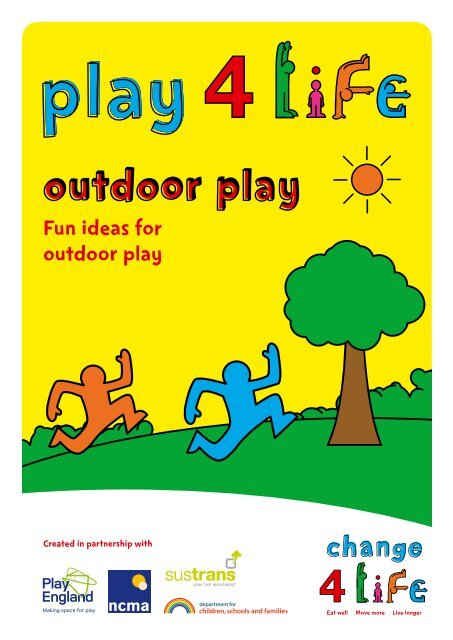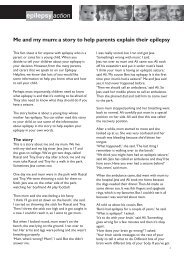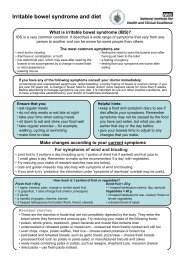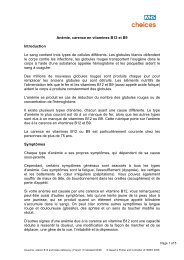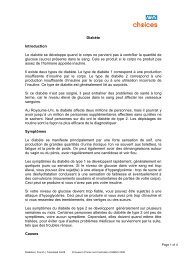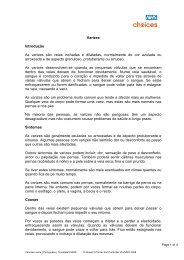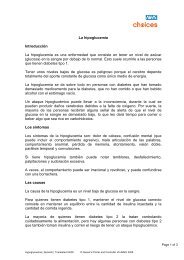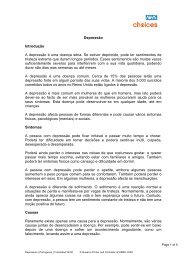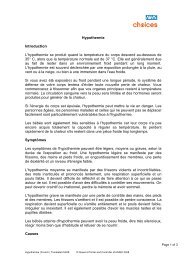Create successful ePaper yourself
Turn your PDF publications into a flip-book with our unique Google optimized e-Paper software.
<strong>play</strong><br />
outdoor <strong>play</strong><br />
Fun ideas for<br />
outdoor <strong>play</strong><br />
Created in partnership with
<strong>play</strong>ing outside<br />
Many of us have great childhood memories of <strong>play</strong>ing outdoors – running around,<br />
climbing trees, building dens, inventing new games that kept us occupied for hours<br />
– these are all things that contribute to a happy, healthy upbringing.<br />
Today, with less natural space and more distractions it’s more important than ever<br />
to encourage kids to <strong>play</strong>. Wherever you live, the outdoors can be the ultimate <strong>play</strong><br />
environment and children love looking for hidden <strong>play</strong> spaces near their home.<br />
Lots of games and activities can be <strong>play</strong>ed in the garden if you have one. Or, if you<br />
live in a city, look for commons and parks, city farms or even areas of rough ground<br />
that are only a short walk or cycle ride away. If you live out of town, there will be<br />
village greens, local fields, woodlands and maybe even beaches to run around where<br />
kids can let off steam.<br />
Whatever the weather<br />
Try not to let bad weather put you off: <strong>play</strong> needn’t be spoiled by a bit of rain. In fact,<br />
kids are usually less worried by a little cold and rain than their parents, especially if<br />
they’re running around and keeping warm!<br />
If it’s wet and muddy outside, why not dress them in old clothes and wellies and let<br />
them splash around in your nearest park or the garden?<br />
A place to <strong>play</strong><br />
• An area of woodland filled with trees, bushes and places to build a den.<br />
• A local <strong>play</strong>ground or park filled with challenging equipment for the children to test<br />
themselves on.<br />
• An area of open space – a field, common or football pitch where they can fly kites,<br />
kick a ball around or simply run as fast as they can!<br />
• If you’re feeling adventurous, you could set up a campsite and even build an obstacle<br />
course through the trees.<br />
Government support for outdoor <strong>play</strong><br />
The Department for Children, Schools and Families is investing £235m between 2008 and<br />
2011 to support local authorities, communities, parents and children in providing safe and<br />
exciting <strong>play</strong> facilities. This will fund 30 new, staffed adventure <strong>play</strong>grounds and 3,500<br />
new or refurbished <strong>play</strong> areas. All local authorities in England have been given at least £1m,<br />
so contact yours to find out where the nearest <strong>play</strong> facilities are or will be located.<br />
2
<strong>play</strong>ing in the great outdoors<br />
Play for kids is most rewarding when they start it themselves, and it<br />
doesn’t take much to spark a child’s imagination. Given half a chance<br />
kids will throw themselves into <strong>play</strong>, especially if there are friends or<br />
brothers or sisters around. If they have ideas of their own, why not<br />
help the kids develop them and see where they take them. Using their<br />
own imagination is the best way to <strong>play</strong>.<br />
If you want to join in, and suggest some games to <strong>play</strong>, we’ve pulled<br />
together some great games and activities to get you started and help<br />
inspire the kids to make up their own.<br />
Very few of the ideas need expensive equipment. Most of the time, all<br />
you need are some everyday household items, things you find outside,<br />
or just your imagination.<br />
3
Toddlers and preschool kids<br />
Duck, Duck, Goose<br />
Everyone sits in a circle. Then one <strong>play</strong>er – the fox – walks around the outside,<br />
tapping people on the head and saying ‘duck’. But if they tap someone and say<br />
‘goose’, that <strong>play</strong>er jumps up and chases the fox around the circle.<br />
If the fox makes it all the way around to where the goose was sitting and sits in<br />
their space, then the goose becomes the fox.<br />
But if the goose tags the fox while they’re running around, the goose goes back<br />
to their space and the fox has to start again.<br />
Hide and Seek<br />
One person covers their eyes and counts to 50 while the others run and hide.<br />
Once someone is found, they join the ‘seekers’ until everyone is found.<br />
The last person to be found is the winner.<br />
What’s the time Mr Wolf?<br />
Everyone starts by standing in a line. One <strong>play</strong>er is Mr Wolf and they take 20<br />
paces forward and stand with their back to the others.<br />
Then the others all call out together “What’s the time Mr Wolf?”. The wolf turns<br />
around and calls out a time, for example “8 o’clock”, which means the others take<br />
8 steps forward. 3 o’clock is 3 steps, 5 o’clock is 5 steps, etc.<br />
They keep on doing this until Mr Wolf decides to shout “DINNER TIME!” instead,<br />
and chases the group. If he catches someone before they reach where they started<br />
they become the wolf.<br />
4
5-8 year olds<br />
These games are really easy to <strong>play</strong> and they don’t even need<br />
any equipment!<br />
Bulldog<br />
Mark out a large <strong>play</strong>ing area with four sides.<br />
One person is ‘on’, and the rest line up on one side of the square. They have<br />
to get to the other side without being touched by the person in the middle.<br />
Once you have been touched, you join the <strong>play</strong>er(s) in the middle until only<br />
one person is left. They are ‘on’ for the next game.<br />
Tag<br />
One person is ‘it’. They chase the rest until they touch or ‘tag’ someone, who is<br />
then ‘it’. Simple, but lots of fun!<br />
For a fun addition to the rules, a <strong>play</strong>er can avoid being tagged for a short while<br />
if they crouch down and shout out the name of a vegetable – this means that<br />
they are safe.<br />
Stuck in the Mud<br />
Like Tag, but when one <strong>play</strong>er is caught, they must stand still with their legs<br />
apart. This means they are ‘stuck in the mud’ and can only be set free by<br />
another <strong>play</strong>er crawling through their legs.<br />
The last person to be caught is ‘it’ for the next game.<br />
Blob Tag<br />
Start with two people as ‘the blob’ by linking arms – they are not allowed to<br />
break the link.<br />
Once the blob tags someone, they become part of the blob – so now it’s a<br />
three person blob. Only the ends of the blob can tag someone, so other <strong>play</strong>ers<br />
can go through the rest of the blob without being caught. The winner is the<br />
person who has escaped the blob!<br />
5
5-8 year olds<br />
These next games mostly just need a couple of items to <strong>play</strong>, and they’re<br />
all things you might be able to find around the house or pick up cheaply.<br />
Dodgeball<br />
Equipment needed – 6 large, soft balls<br />
Find an area you can <strong>play</strong> in and split everyone into 2 teams. You’ll also<br />
need someone to be a referee.<br />
Each team starts with 3 balls and throws them at <strong>play</strong>ers on the other<br />
team. If a <strong>play</strong>er’s body is hit, they are out (the head is not a target and<br />
doesn’t count).<br />
If someone on the other team catches the ball, then the thrower is out!<br />
The winning team is the team with the last <strong>play</strong>er left in.<br />
Five Pin Football<br />
Equipment needed – 5 empty 2-litre plastic bottles, a few footballs<br />
Divide the kids into 2 teams and get them to line up at opposite ends of<br />
an open space. Half-fill the 5 bottles with water and put them in the<br />
middle of the area.<br />
At the start signal, get <strong>play</strong>ers to kick (or roll if they are very young) the<br />
footballs from their line to knock down a pin. If a <strong>play</strong>er knocks down a<br />
pin, they must run out and set it back up.<br />
Teams score one point for each pin knocked down and the first team to<br />
five points wins.<br />
6
5-8 year olds<br />
Sponge Toss<br />
Equipment needed – 2 buckets and a big sponge per team<br />
This game is great if you’ve got a large group.<br />
Split everyone into teams of 4 or 5 and give each team 2 buckets and a<br />
sponge (a car sponge is ideal). Fill one bucket with water and mark the<br />
empty bucket with a line about half way up.<br />
Then teams stand in a line with the full bucket and sponge at one end and<br />
the empty bucket at the other.<br />
Player 1 dips the sponge in the full bucket and throws it to the next <strong>play</strong>er,<br />
who’s standing a few feet away. The sponge goes all the way down to the<br />
final <strong>play</strong>er, who squeezes it into the empty bucket.<br />
The last <strong>play</strong>er then runs back to the water-bucket at the front and<br />
everyone moves down one place. This carries on until one team wins by<br />
reaching the line marked on the second bucket.<br />
But remember – if the sponge is dropped it must be returned to the start<br />
of the line!<br />
Softball Olympics<br />
Equipment needed – 2 softballs<br />
Create two teams and give each team a ball. Then do the following<br />
relay races:<br />
• Put the ball under your armpit and run to a line and back.<br />
• Put the ball between your knees and hop to a line and back.<br />
• Two team-mates run and throw the ball back and forth between them.<br />
• Team-mates line up in a leapfrog formation and the first <strong>play</strong>er hops<br />
over <strong>play</strong>ers while holding the ball, and then tosses it to the next <strong>play</strong>er<br />
in the line to do the same.<br />
Teams score ten points for a win and minus one point every time the ball<br />
is dropped. dropped. At the end of the the Olympics, tot up the scores to see who wins!<br />
Useful tip: It’s up to you whether you supervise these<br />
games, but sometimes it’s useful to have an impartial<br />
referee to keep things running smoothly! Try to make<br />
the games competitive but also fun, so losing is no<br />
big deal and kids are happy to <strong>play</strong> again.<br />
7
5-8 year olds<br />
Many of these next games can be <strong>play</strong>ed by kids of all ages.<br />
Ball games<br />
One of the all-time easiest ways to get kids running around and making up<br />
games is to bring along a ball. Any ball will do:<br />
• A football, rugby ball, beach ball or even a volleyball.<br />
• Or, try a bat and ball, racquet and ball or swingball.<br />
• And don’t forget other ‘props’ like frisbees and kites to get the kids<br />
running and <strong>play</strong>ing.<br />
Building games<br />
These can be anything from making a den in the woods or building a tree<br />
house to putting up a tent in the garden. Once the kids have a base to get<br />
started, their imaginations will go into overdrive building other games around<br />
the den!<br />
Playing on wheels<br />
Bikes, skateboards, roller-skates, scooters, go-karts – <strong>play</strong>ing on wheels is<br />
active, fun and develops useful skills of balance and co-ordination. It’s worth<br />
taking a bit of time to find a good place for these activities; a nearby park or<br />
<strong>play</strong>ground that allows bikes and skates, so you know your kids are <strong>play</strong>ing<br />
where it’s safe.<br />
Skipping games<br />
Skipping is a great way to get active, especially if there isn’t much space to run<br />
around. If you can’t remember any good skipping games, why not ask friends or<br />
neighbours? There are hundreds all around the world and you can find some good<br />
ones on www.<strong>play</strong>groundfun.org.uk<br />
8
Play for all families<br />
At Change4Life, we believe that all children should be encouraged to <strong>play</strong>. Some of the<br />
games outlined in this guide may not be suitable or practical for all families, but many of them<br />
can be adapted to individual families including children or parents with disabilities.<br />
Parents can get more ideas for <strong>play</strong> geared towards disabled children or families by<br />
downloading the following documents from the ‘Contact a Family’ website:<br />
www.cafamily.org.uk/pdfs/holidays.pdf<br />
www.cafamily.org.uk/pdfs/westmids/WM061.pdf<br />
Sources for more ideas<br />
Here are some great websites where you’ll find loads of ideas to help your kids <strong>play</strong> outdoors:<br />
www.sustrans.org.uk – Sustrans is the UK’s leading sustainable transport charity with lots of<br />
cycle routes around the country. Look out for the blue cycle signs near you!<br />
www.<strong>play</strong>day.org.uk – Playday is the annual celebration of children’s right to <strong>play</strong>, where<br />
children, young people and communities get out and <strong>play</strong> at hundreds of locally organised<br />
events across the UK.<br />
Here are some more websites for you to visit:<br />
www.gameskids<strong>play</strong>.net www.<strong>play</strong>groundfun.org.uk<br />
Playful parenting: top tips<br />
When <strong>play</strong>ing with children it’s less about what you do and more about the way you<br />
do it. Here are some handy ‘dos and don’ts’ to get you thinking about the way to <strong>play</strong> with<br />
your kids:<br />
1. Do give them the chance to choose what games they <strong>play</strong> and how they <strong>play</strong> them.<br />
Forcing them to do something doesn’t make <strong>play</strong>-time much fun!<br />
2. Don’t solve every task for kids – encourage them to solve the problem themselves.<br />
3. Do remember kids are all different. Think about the kinds of activities your child<br />
likes and let them take the lead.<br />
4. Don’t be a competitive mum or dad. Learning how to lose is an important social skill<br />
for a child, but try to keep games enjoyable and let them win too – sometimes!<br />
5 . Don’t be afraid to join in with make-believe games. Kids love it when parents<br />
<strong>play</strong>-act and it lets their imagination run wild.<br />
6. Do let them enjoy physical challenges like climbing trees. Kids learn through taking risks.<br />
Don’t be over-protective if the worst that can happen is a bump or a scrape.<br />
7. Do get outdoors and <strong>play</strong>: it’s healthy, and if they get dirty or wet, well that’s what baths<br />
and washing machines are for.<br />
8. Do share a game you used to <strong>play</strong> as a child. Think of the things you most enjoyed,<br />
the chances are your kids will enjoy them just as much!<br />
9. Do enjoy <strong>play</strong>ing. If your child is having fun but you aren’t, just leave them to it. If they’re<br />
not having fun, suggest something else.<br />
This and more information about <strong>play</strong> is available at www.<strong>play</strong>day.org.uk<br />
9
the safe outdoors<br />
Everyone’s neighbourhood is different, but wherever people live there’s sure<br />
to be a local park or <strong>play</strong>ground nearby. And with the Government providing<br />
funding for local authorities to create 30 new adventure <strong>play</strong>grounds and<br />
develop 3,500 new or refurbished <strong>play</strong> areas in England by March 2011,<br />
there are bound to be even more options in the near future.<br />
When <strong>play</strong>ing outdoors, if you are unsure about safety, you should check the area yourself<br />
before taking children to <strong>play</strong> there. Most modern <strong>play</strong> areas are made from impact-absorbing<br />
materials rather than concrete, and grass is an ideal surface along with most other natural<br />
surfaces. If kids are on their bikes, you can read Tips for Safer Biking, which is part of the<br />
Bike4Life toolkit available on the Change4Life website.<br />
Traffic is another consideration. Make sure your kids know the basics of road safety to help<br />
them to <strong>play</strong> safely in your neighbourhood and on the way to <strong>play</strong> areas and school.<br />
Talk through potential safety issues openly with your kids and tell them how you would want<br />
them to respond if things go wrong, while they are out <strong>play</strong>ing. This way they are in a much<br />
better position to be able to judge situations for themselves, and to avoid danger.<br />
Risk and reward<br />
Try to allow kids to test and stretch themselves – just as you did at their age. Remember, small<br />
risks are an essential part of <strong>play</strong>, which often means mastering new tasks or conquering fears.<br />
This is an important part of developing new skills and independence.<br />
The key is knowing the risks involved and balancing them with all the benefits and rewards<br />
of <strong>play</strong>ing.<br />
Sometimes, kids and parents are worried about anti-social behaviour, such as bullying. If this<br />
is a serious concern, speak to your school or the neighbourhood police for expert advice.<br />
10


